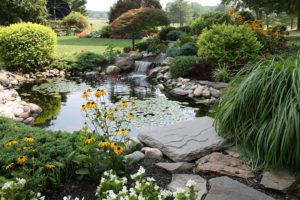
Keep your garden ponds beautiful and healthy with these tips.
As warm weather arrives, it may feel great for those who made it through the winter, but the aquatic life in your garden ponds may suffer. Warm temperatures can be good for the growing season, but extreme temperatures can stress your landscape. Your garden ponds need extra care during the hottest times of year to ensure that your pond fish and other wildlife maintain good health. Depending on your environment, a garden pond may be susceptible to an increase in photosynthesis, rapid rates of water evaporation, and faster growth of algae. Additionally, as the water temperature rises, it loses the ability to hold oxygen, which makes it difficult for fish to breathe. Fortunately, there are things you can do to treat your aquatic wildlife this summer. Scientific Plant Service can help you navigate this season and prepare for various temperatures.
It’s All About Shade
Protecting your garden ponds with shade is the most effective method of maintaining consistent and safe pond temperatures. There are a few ways to shade your pond. First, you can use outdoor canopies or awnings that you can adjust according to changing temperatures. You may even design a garden arbor to shade your garden ponds.
You can also use garden pond plants such as water lilies, water lettuce, water hyacinth, and Salvinia to provide shade to your pond and keep the water cool. You may also plant trees and shrubs near your pond for future growth that will provide shade to this area of your landscape.
You may also consult Scientific Plant Service on the best pond shades and dyes to use. Dyes darken the water, creating a more appealing presentation while blocking excess sunlight from penetrating the water and increasing plant and algae growth.
Look for Evaporation and Water Your Pond
Soaring temperatures means rising levels of water evaporation. If your garden ponds experience a period of little rain and high heat this summer, you may need to add water back to the pond to maintain the health of the pond’s plant life and fish. Consider topping up the pond water once a week using rainwater collected from your gutters and roof.
Use an Aeration Pump
As water gets warmer, oxygen levels decrease. The fish and plants that live in your pond require oxygen to survive. You can help supply oxygen during these difficult periods with an aeration pump that provides oxygen to your garden ponds. You can also keep your pond fish happy with the following tips:
- Avoid overfeeding fish. They are more active in warmer temperatures, which means eating more food and producing more waste. To maintain your water quality, don’t over-feed.
- If your pond is above ground, use soil and decorative stones to insulate the edges and protect your fish from extreme temperatures.
- Clean pond filters regularly to ensure they are not clogged. When in doubt about care for your garden ponds, contact Scientific Plant Service for aquatic care tailored to your needs.
Scientific Plant Service Is Your Go-To Source In Landscape Healthcare
Scientific Plant Service, located in Baltimore, is a privately owned corporation, chartered in Maryland in 1957 by Frank J. Burke. We started as a full-service Arborists specializing in the care of shade trees and ornamental shrubs, but today we are a Lawn Care company that is a huge part of the community. From aquatic environments and snow management to deer and mole control, SPS has services tailored specifically for your lawn and landscape.
We offer services in Maryland, Washington, DC, and Virginia, including: Harford, Baltimore, Carroll, Frederick, Howard, Anne Arundel, Montgomery, Prince Georges, Talbot, Queen Anne’s, Calvert counties in MD, as well as Loudoun County, Fairfax County, Arlington, Alexandria, and Falls Church in VA. For more information, contact us online, or call us at 410-321-0970. Be sure to follow us on Facebook, Twitter, LinkedIn, Instagram, and Pinterest.

